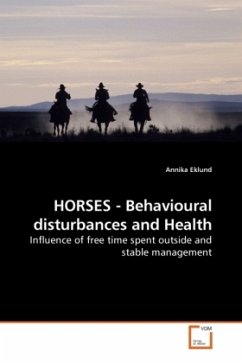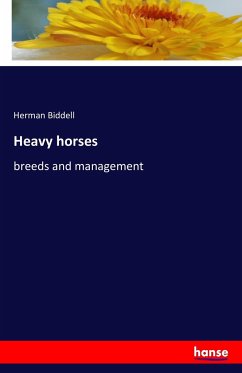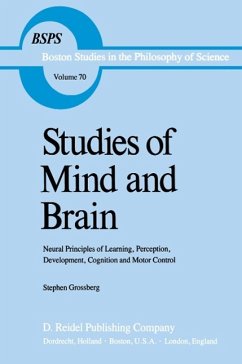
Fear in Horses and Riders: Two Hearts Living in just One Mind
How Rider, Training and Genetics Influence Horses' Fear
Versandkostenfrei!
Versandfertig in 6-10 Tagen
39,99 €
inkl. MwSt.

PAYBACK Punkte
20 °P sammeln!
Horses' fear reactions can lead to problems such as accidents and injuries to horse and rider. The objective of this work was to identify factors influencing fear in riding horses. Results revealedthat riders could induce nervousness in the horse byunconsciously communicating their own nervousness. Riding style also had immediate consequences for fear reactivity in horses: When horses were riddenin the more coercive, and to the horses aversive, Rollkur style, they showed stronger fear than when they were ridden in a regular riding style. In contrast, horses of genetic show-jumping lines exhibi...
Horses' fear reactions can lead to problems such
as accidents and injuries to horse and rider. The
objective of this work was to identify factors
influencing fear in riding horses. Results revealed
that riders could induce nervousness in the horse by
unconsciously communicating their own nervousness.
Riding style also had immediate consequences for
fear reactivity in horses: When horses were ridden
in the more coercive, and to the horses aversive,
Rollkur style, they showed stronger fear than when
they were ridden in a regular riding style. In
contrast, horses of genetic show-jumping lines
exhibited weaker fear reactions than horses of
dressage lines regardless of their longterm
training experience. It was concluded that fear
reactivity in horses could be reduced: 1) by
genetically selecting against fear reactivity in
horses, 2) by employing less coercive riding
techniques and 3) potentially by developing and
training specific techniques, such as muscle
relaxation, that allow riders to interrupt the
exchange of nervousness between rider and horse.
Ultimately these approaches could aid to improve
safety and welfare of both horses and riders.
as accidents and injuries to horse and rider. The
objective of this work was to identify factors
influencing fear in riding horses. Results revealed
that riders could induce nervousness in the horse by
unconsciously communicating their own nervousness.
Riding style also had immediate consequences for
fear reactivity in horses: When horses were ridden
in the more coercive, and to the horses aversive,
Rollkur style, they showed stronger fear than when
they were ridden in a regular riding style. In
contrast, horses of genetic show-jumping lines
exhibited weaker fear reactions than horses of
dressage lines regardless of their longterm
training experience. It was concluded that fear
reactivity in horses could be reduced: 1) by
genetically selecting against fear reactivity in
horses, 2) by employing less coercive riding
techniques and 3) potentially by developing and
training specific techniques, such as muscle
relaxation, that allow riders to interrupt the
exchange of nervousness between rider and horse.
Ultimately these approaches could aid to improve
safety and welfare of both horses and riders.












